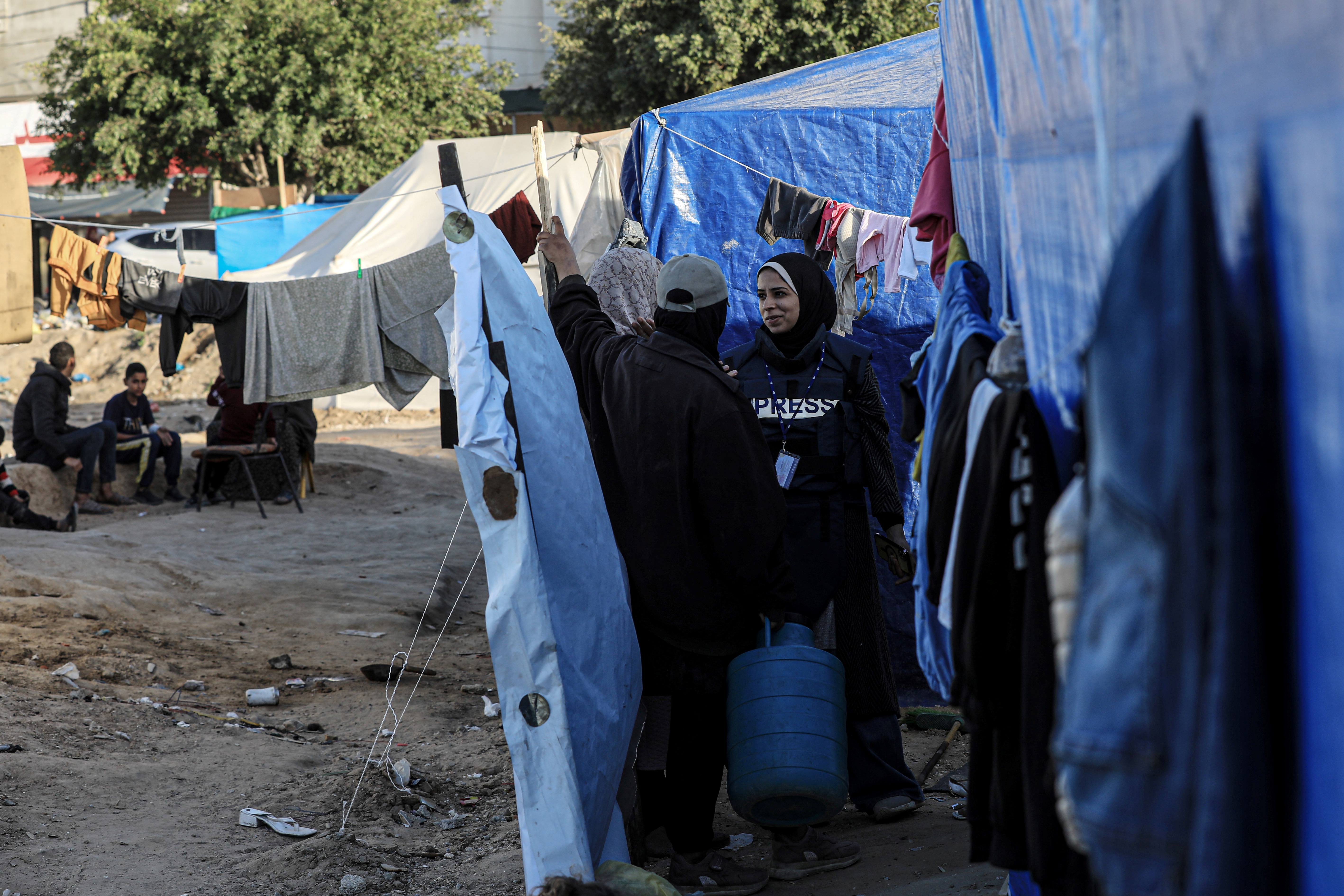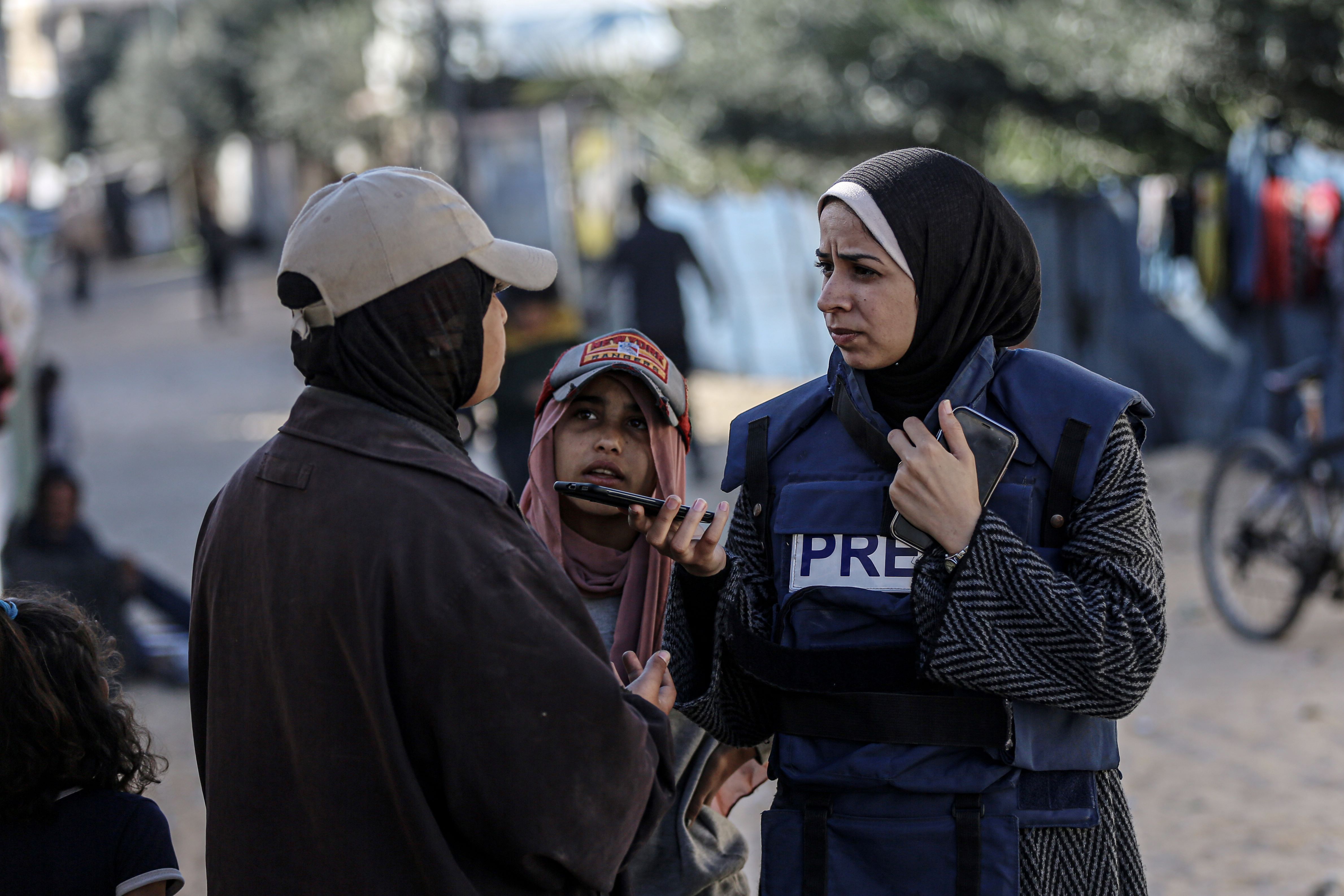“I am exhausted.” This word sums up more than six months of continuous coverage of the ongoing war on Gaza.
I am exhausted because my mind and heart are constantly at odds. They wrestle over the stories I’ve written, am writing, and will write, and over choosing from the countless painful stories around us—tragic, sad, and overwhelming stories that you cannot simply overlook. It’s a difficult and intense struggle between them: the battle of reason and emotion.
Nothing seems logical, and when we talk about logic, the natural outcome of witnessing the horrors of this war that has raged on for months is that we are left undeniably exhausted. Neither heart nor mind can bear all this madness.
I sleep, wake up, walk, cook, wash clothes by hand, and care for my infant while my mind is busy, working and writing the stories it constantly observes—stories about the woman who can’t find a tent to sleep in with her four children and sleeps on the street, the man who was finally released after being captured by the occupation from the north and now sells tea in the hospital, the young woman in her final year of dental school who couldn’t complete her education and now sits despondently in a tent, and the young mother who pleads with journalists every day to find baby food for her withered and weakened daughter, and the women who sleep in hospital corridors searching for shelter for their children from the heat and cold.
I sleep, wake up, walk, cook, wash clothes by hand, and care for my infant while my mind is busy, working and writing the stories it constantly observes
My mind is always working, thinking about every scene it encounters daily in the field, from the doorsteps of the house I was displaced to, to the corridors of the hospital filled with displaced people, martyrs, and the injured.
Since the war began, I’ve been doing my best, but I often find myself helpless. I tell myself and my colleagues in the newsroom that I need twenty journalists to work with me to document even a fraction of what I see; there isn’t enough space, time, physical capacity, or mental bandwidth to document all this atrocity. Meanwhile, my mind doesn’t rest—it writes, erases, sends ideas and suggestions, and finds a story at every step that needs to be told. But my heart and body can’t keep up; my heart is on the verge of stopping, and my body can no longer bear it.
Since the war began, I’ve been doing my best, but I often find myself helpless. I tell myself and my colleagues in the newsroom that I need twenty journalists to work with me to document even a fraction of what I see; there isn’t enough space, time, physical capacity, or mental bandwidth to document all this atrocity
My heart constantly reminds my mind that I am part of this cycle, that I am not detached from this story; I am a displaced person who left my home at the beginning of the war and moved south. I am a mother of two children, and my beautiful home, which we had just moved into a year and a half ago, was bombed and reduced to rubble, with all the memories buried under the debris. I struggle daily to provide baby formula for my infant and to find food and vegetables at exorbitant prices. I am deeply saddened that my eight-year-old daughter sits idle without education, missing the school year like all the children. And above all, the bombing continues—near and far, in front of us and behind us, beside us and next to us, above us and below us, day and night. We’ve been living on edge for months, fearing a sudden strike. "Oh God, we are exhausted."
But my mind doesn’t stop pulling me from my place every day. "What do you think about working on the story of the energetic girl who stands in line to buy bread every morning, and in the evening, collects the clothes of journalists staying in the hospital to wash them for a small fee to help her family? This is a powerful story that people need to know." And the story of that ambitious young man who fastens a mobile phone in the air on a long wooden pole and uses it to distribute internet to the people in the camp—believe me, that’s a powerful story too; it would be a shame not to write about it.
;I am a displaced person who left my home at the beginning of the war and moved south. I am a mother of two children, and my beautiful home, which we had just moved into a year and a half ago, was bombed and reduced to rubble, with all the memories buried under the debris
My mind deceives me for a moment, convincing me every day to prepare myself for work. I get my child ready and ask my sister to take care of him. I dress, put on my press vest, and get in the car to go to the hospital—the place of work, internet access, and the meeting point for many "stories" that can be shared.
On the way to the hospital, my energy starts to drain immediately; thousands of displaced people are in the streets, everywhere, selling firewood and internet cards, nylon tents, water and bread lines, sweat, and sunburnt skin, exhaustion, and distress on everyone’s faces, thousands sitting on the sidewalks, misery everywhere. My mind is terrified of these scenes because it fears I might retreat. It convinces me that we must adapt, and then breathes a sigh of relief as I take another detour.

We arrive at the hospital, and I’m once again confronted by the water que for the displaced there. I look at the woman crying from exhaustion and waiting, then enter the hospital where a young woman asks me for diapers for her baby, and I can’t promise to help her, so she apologizes and leaves. I stand silently as I see the line of women and men near the bathroom; no privacy, no cleanliness, and showering seem like a dream in such circumstances.
I walk a bit in front of the emergency entrance, and an ambulance arrives from behind, people run towards it and crowd around it, and journalists rush towards it saying, "There was a strike in Bureij." The paramedics unload more injured and torn-up martyrs, and two civilian cars rush in, honking loudly, carrying more casualties from the site—a woman injured in the head and a young man wounded in the chest. They shout at people, "Move aside, clear the way."
It’s like the Day of Judgment! But I’ve become accustomed to the scene. I put my bag in the work tent and go out to hear the cries over the body of a little girl who has become a martyr, and I see a small group of people performing funeral prayers for a martyr they pulled from under the rubble yesterday. People run between the morgue and the reception, mothers and women arrive devastated by news of their "loved ones" who were snatched by Israeli missiles. They scream, cry, and collapse on the ground, while men shout at them: "Be strong, your son is a martyr!" The morgue is filled with more martyrs, while people crowd in front of the washing area; there’s even a line for washing the bodies!
A father carries his daughter’s body and waits for his turn for washing and shrouding; no mourners, no funerals. Those who get the chance for shrouding and burial in the cemetery are as if they’ve been given the world in these times. Someone calls for a quick funeral prayer for a few martyrs, and seven or eight men line up to pray, then people carry the bodies of their loved ones and walk to the burial. All this while a man sells tea, exhausted people drink coffee around him, and children sell lupine and roasted peanuts to earn a living. The scene has become so normal, and the sadness in its details has become a luxury; there’s no time or place to say goodbye to "loved ones" in Gaza.
Amid all this, my mind feels ashamed of me, it falls silent and calms down completely, it stops "nagging." My mind now understands that I cannot comprehend it all, it knows it has lost the battle again. The daily battle to work on a new journalistic story. Truly, who can comprehend all this? Who in the world can bear all this? Every day? Certainly, no one.
My mind and I sit together, making a small agreement to calm down a bit and rest because there’s no point; there’s no point in writing or talking. Neither heart nor mind can bear any more.
But then doubt awakens within us again; if we don’t write, who will? If we don’t cover, who will? Who will tell the stories of the martyrs, who will document the catastrophe for history? Oh God, what injustice is this! How can the story die, how can we bury our departed loved ones in this genocide without documentation or mourning?
"The world does nothing," I rise from my place as I close the computer. The shelling intensifies, and more ambulances arrive. At the top of the hour, my fellow correspondents stand ready to start the "live" broadcasts. I walk past the live cameras, indifferent; more than 200 days of live broadcasts, interviews, and articles—I ask my heart, what’s the point? I ask my mind, what’s the point?








































